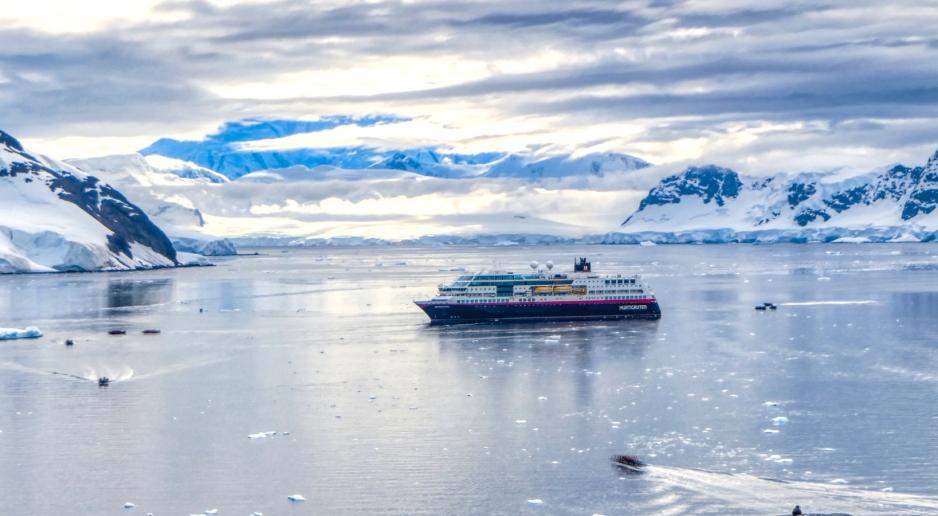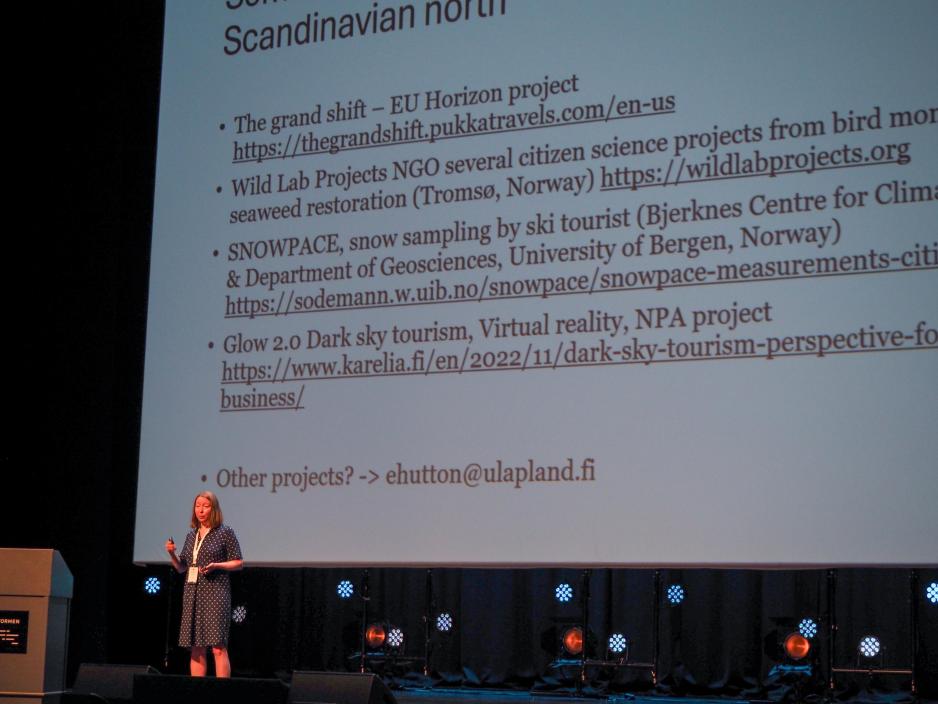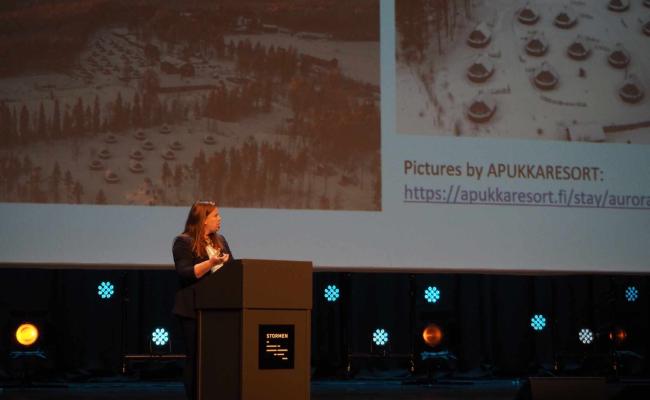Tourists Visit the Arctic on Science Cruises: A Risk of Greenwashing Arctic Tourism?

Hurtigruten is one of the cruise operators offering citizen science activities on Svalbard. (Archive photo: Courtesy of RV Navigator on Flickr.com under CC BY 2.0)
To diversify tourist experiences in the Arctic, many operators now offer science cruises where tourists can participate in polar expeditions. However, this emerging trend offers some challenges regarding sustainable tourism and the protection of vulnerable environments. Researcher Elina Hutton says that nearly all cruise tourism operators selling citizen science activities are greenwashing.
Cruise operators such as Ponant, Lindblad, Hurtigruten, and Bark Europa offer Arctic science expeditions for tourists to explore polar regions under the guise of science.
The cruises transport scientists and tourists to polar regions, where the scientists conduct their projects and gather data. The tourists can help and participate while also learning about the environment from the scientists. The concept is called 'citizen science.'
Cruise operator Ponant argues, "Passengers relate much more to the environment and are much more motivated to protect it when they are directly involved in collecting scientific data."
In an interview with High North News, tourism researcher Elina Hutton at the University of Lapland says that cruise tourism cannot be sustainable either way.
"Cruise tourism creates so many waste management issues, possible risks for the environment and people’s health. There are a lot of environmental hazards involved in being on a big cruise to Svalbard, for example. In my opinion, it cannot be sustainable."
Although many operators are becoming more environmentally friendly and taking a more sustainable approach, Hutton says it is very disturbing for the whole ecosystem.
Combining polar cruise tourism and science
A recent scientific article, ‘Combining polar cruise tourism and science practices,’ by Machiel Lamers, Nathalie A. Steins, and Linde van Bets, examined two tourist science expeditions to Svalbard in 2015 and 2022.
Lamers et al. concluded that creating connections between science and tourism had generally positive outcomes for the visitor experience and the popularisation of polar science but that it also offered some complex challenges.
On Svalbard, the complex regulations presented a logistical puzzle: Who was allowed to go where and with whom?
The researchers state that if the combination of science and tourism is not managed carefully, it could have negative implications for various groups of practitioners or vulnerable polar environments.
Most tourists were very satisfied with the experience and recommended continuing to organize such trips, while nearly half of the scientists (49%) were in the 'no' and 'I don't know' groups. This group included scientists who felt their scientific routines were more or less incompatible with the tourism routines.

Elina Hutton from the University of Lapland during the Arctic Congress in Bodø, where she presented her work on science tourism in the Arctic. "Are we creating even more last-chance tourism by focusing on the scientific aspect of the Arctic?" she asked. (Photo: Birgitte Martinussen)
Public-private partnerships
The collaboration between private operators and public institutions in conducting science tourism is an important factor in its execution.
Lamers et al. highlight that polar science and tourism may combine to create positive synergies between science and commercial tourism operations. The researchers state that:
“Tourists form a direct audience that enables scientists to explain the relevance of public funding of scientific research in areas far away from the taxpayers’ homes. At the same time, product diversification by offering scientific activities allows cruise operators to provide unique experiences and distinguish themselves from an increasing number of competitors.”
Researcher Elina Hutton says public-private partnerships are beneficial to both science and tourism:
"Whale safaris from Andenes, for example, often have a scientist onboard. They educate the tourists on the whales and their ecosystems and how they know where the whales will be. Many pictures are taken on these trips, which the scientists can use to identify the whales. They compare the photos and see who's been where. So these trips are very much helping the scientists. Going out on a boat daily to observe the whales for science would be expensive. But it is manageable when they can have tourists onboard who pay for the trip."
Greenwashing Arctic tourism?
A risk following science tourism initiatives is the potential for greenwashing tourism activities by introducing citizen science initiatives.
Lamers et al. highlighted that polar tourism operators have been criticized for exploiting science in developing positive narratives to legitimize the sector's growth in the Polar Regions in light of its impact on climate and environment.
When assessing the sustainability impact of the expedition cruises in question, the researchers observed that sharing ships or facilities did not necessarily lead to energy efficiencies or other sustainability benefits.
"For example, a more complex set of activities on board could very well lead to more shipping time or a more intense use of Zodiacs to facilitate all the different kinds of groups. During the expeditions, many of the scientists had to accept a trade-off between the scientific value of the expedition and other benefits, such as the networking opportunities, the media attention for their science, or the polar cruise experience itself."
Researcher Hutton tells HNN that she would be inclined to say that when it comes to cruise tourism, nearly everything related to science tourism and environmentalism is greenwashing.
"There is the element of being able to educate passengers. Even if you reach one person and you really reach them, it is always worth doing that. But is it worth taking 200 people on a cruise ship through the Northwest Passage just to reach one person? We might have been able to find other ways," says the researcher and continues:
"Knowing how expensive these cruises are, the target group is one that consumes a lot, so if we reach anyone there, it has a huge impact compared to reaching someone who already consumes very little. The change in behavior per person is very big, but it by no means balances out the negative consequences of cruise tourism."
Academic freedom
In a comment to High North News, Researcher Machiel Lamers emphasizes the importance of academic freedom in science tourism. He says that the positive impacts of science tourism depend on the different forms or practices involved.
"It depends on the characteristics of these forms and practices, whether they would be desirable or leading to greenwashing. If tourism is to seek for connection with science (or the other way around), it would have to ensure that actual meaningful science would be possible (allowing for some time and space), that all the necessary permits would be held, that it would not have negative implications for the environment (sampling, getting closer to wildlife), and that academic freedom and independence is guaranteed," says Lamers.
"The most admirable tourism operators would be those who are willing to allow critical science to take place, who reflect critically on their own operations based on science undertaken, and who allow researchers to report on their science freely. In many forms of citizen science in tourism, there would be compromises in any of these requirements," he concludes.





